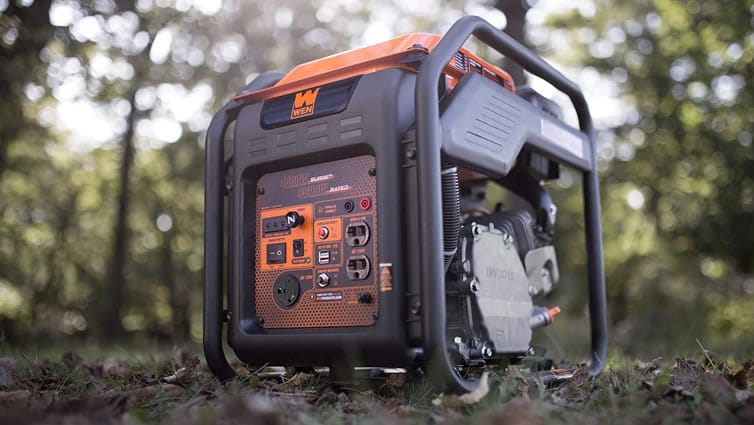Table of Contents
ToggleChampion 7500 Watt Generator Overview
The Champion 7500 Watt Generator is a powerful and versatile solution for both residential and commercial use, providing reliable power when you need it most. With a peak wattage of 7500 and running wattage of 6000, this generator is capable of handling heavy-duty appliances, making it ideal for home backup during power outages, as well as for camping trips and outdoor events.
Equipped with a dual-fuel feature, the Champion 7500 Watt Generator can run on either gasoline or propane, offering flexibility and convenience depending on your fuel availability. It’s designed with a user-friendly control panel, making it easy for anyone to operate, and comes with a built-in CO Shield that enhances safety by automatically shutting down the generator if dangerous carbon monoxide levels are detected.
This generator is built for durability and convenience, featuring a durable steel frame and a large 6.1-gallon fuel tank that can provide up to 8 hours of run time at half load. With its electric start function, the Champion 7500 Watt Generator is simple to start, even in tough conditions. Whether you’re powering essential home appliances, tools, or outdoor gear, this generator ensures you’ll have the power you need. It’s also designed with noise-reducing technology, making it quieter than many other generators in its class, providing a smoother, more comfortable experience whether you’re using it at home or on the go.
Choosing the Right Fuel for Optimal Performance
When it comes to getting the most out of your Champion 7500 watt generator, choosing the right fuel plays a pivotal role in ensuring its optimal performance. After all, without the right fuel, even the best generator will struggle to deliver the power you need. The Champion 7500 watt generator is versatile and designed to run on multiple fuel types, which gives you flexibility, but it’s crucial to understand which fuel will maximize its efficiency and longevity. In this section, we’ll explore the different fuel options available, their benefits, and how to choose the best one for your needs.
Gasoline vs. Propane: What’s the Best Option?
The Champion 7500 watt generator is designed to work with both gasoline and propane, giving you the choice of two different fuel options. Both gasoline and propane have their pros and cons, so understanding their differences is key to choosing the right fuel for your generator.
Gasoline is widely available, and most people are familiar with how to use it, but it has a downside. It can be difficult to store for long periods since gasoline degrades over time, especially in warmer temperatures. If you plan to store your Champion 7500 watt generator for long periods, gasoline might not be your best option, as it could lead to engine damage or poor performance when you finally try to use it. However, if you need immediate power and have access to gasoline, it’s a quick and convenient fuel choice.
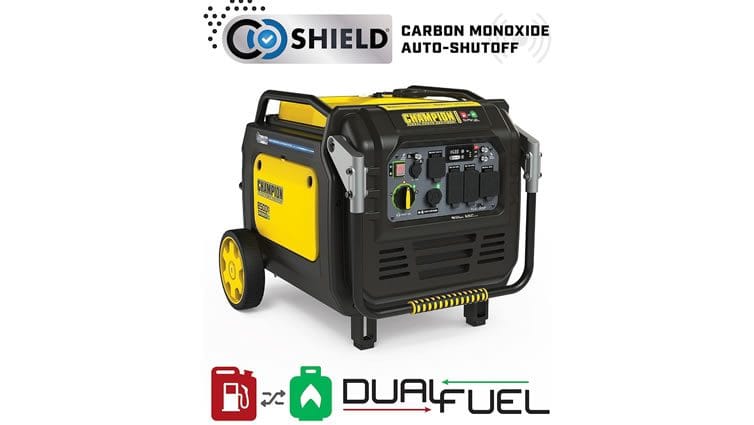
On the other hand, propane is more stable and easier to store for longer periods, making it ideal for backup power situations. It also burns cleaner than gasoline, which can help extend the life of your Champion 7500 watt generator. Propane doesn’t degrade like gasoline, so it’s perfect for emergency preparedness, especially if you live in an area where fuel supply can be interrupted. However, propane might be harder to find in remote areas, and it generally provides slightly less energy output than gasoline, meaning you might not be able to run as many appliances simultaneously.
Understanding the Efficiency of Each Fuel Type
One of the major reasons for selecting the right fuel for your Champion 7500 watt generator is fuel efficiency. Gasoline tends to be more energy-dense, meaning it packs more energy into each gallon, providing a longer runtime for your generator. However, the efficiency of gasoline can vary depending on the generator’s load. If you’re running high-power appliances or multiple devices, your generator might consume fuel at a faster rate. For those looking to get the longest possible runtime from their generator, using gasoline can often be the better option if you have easy access to it.
Propane, while not as energy-dense as gasoline, offers its own form of efficiency when it comes to maintenance. Propane burns cleaner, leaving fewer deposits in the engine, which means less frequent maintenance and a longer-lasting generator. Although propane may not run your Champion 7500 watt generator as long as gasoline on a single tank, its efficiency in terms of engine care and the lack of fuel degradation over time can be a significant benefit for long-term use.
Consider Environmental Impact and Personal Preferences
Beyond performance and efficiency, it’s essential to consider the environmental impact of the fuel you choose for your Champion 7500 watt generator. If you’re concerned about reducing your carbon footprint, propane is a much cleaner-burning fuel than gasoline. Propane produces fewer emissions and contributes to lower pollution, making it a greener choice for powering your generator. In areas where air quality and environmental concerns are a priority, propane is an eco-friendly alternative to gasoline.
However, if you live in a region where propane is less accessible or you prefer the simplicity of gasoline, you might find that the convenience of gasoline outweighs the environmental benefits of propane. It all boils down to personal preference and the specific needs of your situation. Whether you prioritize fuel availability, environmental concerns, or simply cost-effectiveness, the Champion 7500 watt generator can accommodate both fuel types without sacrificing performance.
How to Switch Fuel Types for Versatility
One of the best features of the Champion 7500 watt generator is its dual fuel capability. This means you can easily switch between gasoline and propane depending on your needs. Switching fuel types adds versatility to your power options, ensuring that you have backup fuel available in case one option runs low. Whether you’re in an emergency situation or preparing for an outdoor event, being able to use either gasoline or propane makes the Champion 7500 watt generator a flexible and reliable choice.
To switch between fuels, simply follow the instructions provided by the manufacturer. Most models, including the Champion 7500 watt generator, come with a simple switch that allows you to easily toggle between gasoline and propane. While switching is quick and easy, it’s important to ensure that you’re using the correct fuel at the right time. Always check the fuel levels and switch the fuel tank properly to ensure your generator continues to run smoothly and efficiently.
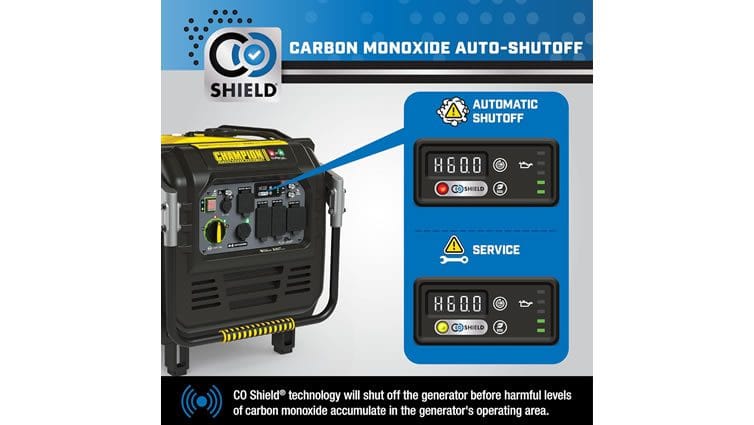
Conclusion: Fuel Selection Matters
In conclusion, choosing the right fuel for your Champion 7500 watt generator is an important decision that directly impacts its performance, efficiency, and longevity. Whether you opt for gasoline for its quick access and higher energy output or propane for its cleaner burn and long-term storage benefits, both fuels offer distinct advantages. The Champion 7500 watt generator allows you the flexibility to choose the best fuel option for your needs, giving you the freedom to adapt to changing situations. By understanding the pros and cons of each fuel type, you can make an informed choice that will help your generator run at its best for years to come.
Managing the load capacity of your Champion 7500 watt generator is crucial for ensuring both safety and efficiency during operation. When using a generator, it’s essential to balance the amount of power you’re drawing with the generator’s capabilities. Overloading can lead to potential damage to both the generator and the devices you’re powering, so understanding how to manage the load is key. Let’s take a closer look at how to manage load capacity effectively and make sure your Champion 7500 watt generator runs smoothly, no matter the circumstances.
Know Your Generator’s Limits
The first step in managing load capacity is knowing the maximum output of your Champion 7500 watt generator. As the name suggests, the generator provides a peak wattage of 7500 watts and a continuous running wattage of 6000 watts. This means that you can safely run appliances or devices that add up to 6000 watts continuously.
However, for short bursts, the generator can handle up to 7500 watts. It’s important to keep these limits in mind and avoid exceeding them. Using appliances that draw more power than the generator can handle will cause the generator to overheat or even break down. Always check the wattage requirements of the devices you intend to power and ensure the total doesn’t surpass the generator’s capacity.
Knowing your generator’s limits doesn’t just mean keeping an eye on the total wattage. It also means understanding how different devices impact the generator in terms of surge power. Devices like refrigerators, air conditioners, and power tools often have a surge wattage that’s higher than their running wattage, meaning they require more power to start up. The Champion 7500 watt generator can handle these short bursts, but it’s important not to exceed the surge wattage too often, as doing so can strain the generator over time. Keep a close eye on the surge requirements of your equipment to avoid putting unnecessary strain on the generator.
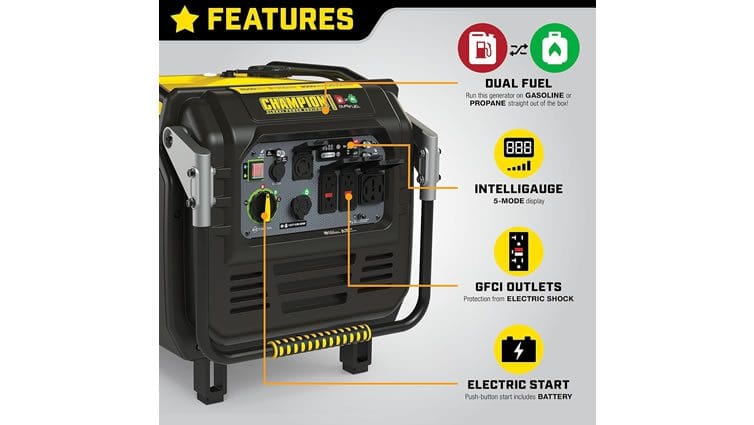
Prioritize Essential Appliances
When you’re using your Champion 7500 watt generator during a power outage or outdoor event, it’s important to prioritize which appliances or devices you’re going to run. Start by identifying the essential items you need, such as lights, refrigerators, or medical equipment. These should always be powered first to ensure your basic needs are met. Once the essential devices are running, you can then plug in additional non-essential items, like televisions or power tools, while keeping an eye on the generator’s load.
A good strategy to manage the load is to use a power strip or surge protector for smaller devices, while large appliances should be plugged directly into the generator. Doing so allows you to monitor how much power you’re using and make adjustments as needed. You may also want to stagger when devices turn on or off to avoid sudden spikes in power demand. For example, avoid turning on the air conditioner, refrigerator, and microwave all at once. This will help maintain a balanced load and keep your Champion 7500 watt generator from being overwhelmed.
Understand Start-Up vs. Running Watts
One of the most important factors in managing load capacity effectively is understanding the difference between start-up watts and running watts. Every appliance has two power requirements: one for running the appliance continuously and one for starting it up. The Champion 7500 watt generator can handle surge power, but knowing the start-up watts of your devices is essential. For example, a refrigerator might need 2000 watts to run, but it could require 4000 watts to start. It’s important to account for these surges and factor them into the total wattage demand.
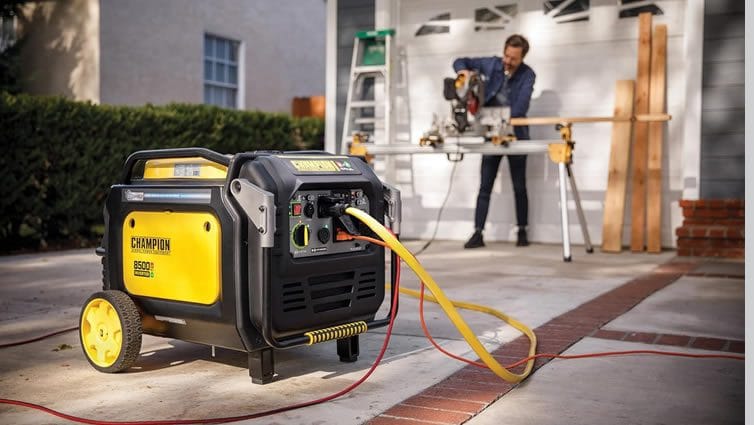
To avoid overloading, you can sequence the start-up of devices. Turn on the most power-hungry devices first, then gradually add the others. This will help spread out the power demand and give the Champion 7500 watt generator a chance to handle each load without being overwhelmed. Knowing how many devices you can safely run at once—and what their start-up wattages are—will help you optimize the generator’s performance and prevent damage.
Use a Power Meter to Track Load
Managing load capacity can be tricky, but using a power meter can help you keep track of how much power your Champion 7500 watt generator is using. Many power meters are designed to plug directly into the generator and provide real-time feedback on the wattage being used. These tools are especially helpful if you have multiple devices plugged into your generator at once. By using a power meter, you can easily see when you’re approaching the generator’s capacity and take steps to reduce the load before overloading occurs.
Some advanced generators, like the Champion 7500 watt generator, even come with built-in meters that display the load in real time. This can make it easier to manage your generator’s performance without the need for extra equipment. Keeping an eye on the load is the best way to avoid overburdening the generator and ensure it operates smoothly. By monitoring the load, you can also make adjustments as needed, ensuring that you’re not running more than what the generator can handle.
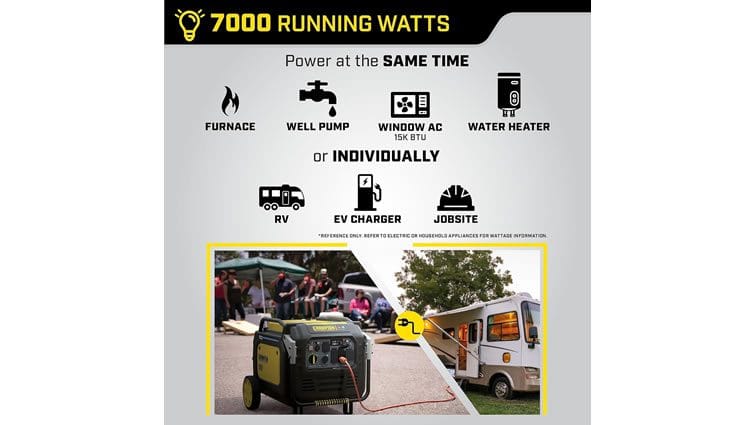
Balanced Power for Better Performance
In conclusion, managing the load capacity of your Champion 7500 watt generator is all about understanding your generator’s limits, prioritizing essential appliances, and using the right strategies to avoid overloading. With a little knowledge and careful planning, you can run your generator efficiently, maximizing its lifespan and performance. By tracking your load, understanding the difference between start-up and running watts, and using a power meter, you’ll be able to make the most of your generator. With these tips in mind, your Champion 7500 watt generator will continue to provide reliable, effective power whenever you need it.
Key Maintenance Practices to Extend Generator Life
Owning a Champion 7500 watt generator means you have a reliable backup power source for your home or outdoor events. But like any other engine-powered equipment, it’s important to take good care of it. Regular maintenance not only ensures that your generator runs smoothly but also extends its life, saving you money on repairs or replacements in the long run. Whether you’re using it for emergency backup power or powering your camping trip, maintaining your Champion 7500 watt generator properly will keep it in top shape and ready to perform whenever you need it.
Change the Oil Regularly
Changing the oil is one of the simplest yet most important maintenance tasks for your Champion 7500 watt generator. Fresh oil keeps the engine lubricated, reducing wear and tear. Over time, the oil breaks down and loses its effectiveness, leading to increased friction inside the engine. To avoid this, check the oil level regularly, and replace it according to the manufacturer’s recommendations—usually after every 50 hours of use or at least once a year if you don’t use the generator frequently.
When changing the oil, make sure to use the recommended type and amount. Too little oil can cause overheating, while too much oil can lead to leaks or foaming, both of which can damage the engine. After changing the oil, run the generator for a few minutes to allow the new oil to circulate, and then check the oil level again. It’s a small task, but it can make a big difference in the performance and longevity of your Champion 7500 watt generator.
Clean the Air Filter
A clean air filter is essential for keeping your Champion 7500 watt generator running efficiently. The air filter prevents dirt, dust, and debris from entering the engine, which could lead to serious damage. Over time, however, the filter can become clogged, limiting the airflow and reducing the engine’s performance. To avoid this, it’s important to check the air filter regularly. If it’s dirty, clean it with compressed air or wash it with soap and water, depending on the type of filter. If the filter is damaged or too clogged to clean, replace it with a new one.
Keeping the air filter clean will ensure that your generator runs smoothly and burns fuel more efficiently. It’s a good idea to inspect the air filter before each use, especially if you’ve been using the Champion 7500 watt generator in dusty or dirty environments, like construction sites or outdoor events. A clean air filter not only improves performance but also helps reduce the wear on the engine, ultimately extending the life of your generator.
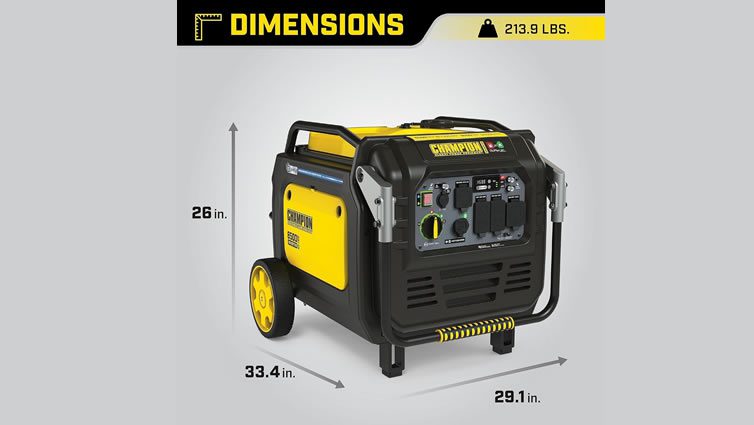
Check the Spark Plug
The spark plug plays a crucial role in the ignition process of your Champion 7500 watt generator. If the spark plug is dirty or worn out, it can cause the engine to misfire or fail to start at all. To ensure smooth operation, check the spark plug at least once a year or every 100 hours of use. If the spark plug is dirty, clean it using a wire brush, or replace it if it’s damaged or too old. A properly functioning spark plug ensures that the generator starts up easily and runs smoothly, helping to prevent any unexpected issues during use.
While you’re checking the spark plug, make sure it’s properly gapped to ensure an efficient spark. If you’re unsure about how to check or replace the spark plug, consult the Champion 7500 watt generator manual for specific instructions. Maintaining the spark plug is a simple step that can prevent many common generator problems and keep your unit running like new.
Keep the Generator Clean
One of the most overlooked maintenance tasks for the Champion 7500 watt generator is simply keeping it clean. Dirt, dust, and debris can build up on the exterior of the generator, clogging vents, and blocking airflow. This can lead to overheating, which may damage internal components and reduce performance. To prevent this, clean your generator regularly, especially after using it in outdoor environments where it might have accumulated dirt or mud.
Wipe down the exterior with a damp cloth to remove dirt and grime, and use a soft brush or compressed air to clean any hard-to-reach spots. Avoid using a pressure washer, as it can force water into the engine and electrical components. Keeping your Champion 7500 watt generator clean ensures that the cooling system works properly, which helps prevent overheating and keeps the generator running efficiently.
Store the Generator Properly
Proper storage is another key factor in extending the life of your Champion 7500 watt generator. When not in use, store your generator in a dry, cool, and well-ventilated space to protect it from the elements. If you plan to store it for an extended period, make sure to drain the fuel tank to prevent the fuel from going stale. Old fuel can cause the carburetor to clog and may prevent the generator from starting. You can also add a fuel stabilizer to keep the gas fresh if you expect to store the generator for a longer period.
Additionally, consider covering your Champion 7500 watt generator with a protective cover to keep it free from dust, dirt, and moisture. Storing it properly not only helps protect the engine but also ensures that your generator is ready to go when you need it. By following these simple storage tips, you can ensure your Champion 7500 watt generator remains in top condition for years to come.
Keep Your Generator in Top Shape
In conclusion, proper maintenance is the key to extending the life of your Champion 7500 watt generator and ensuring reliable performance whenever you need it. By following these simple maintenance practices—changing the oil regularly, cleaning the air filter, checking the spark plug, keeping the generator clean, and storing it properly—you can prevent many common problems and keep your generator running smoothly. These small tasks not only help extend the life of your generator but also improve its efficiency and performance. By taking care of your Champion 7500 watt generator, you’ll get the most out of your investment and enjoy hassle-free power for years to come.


